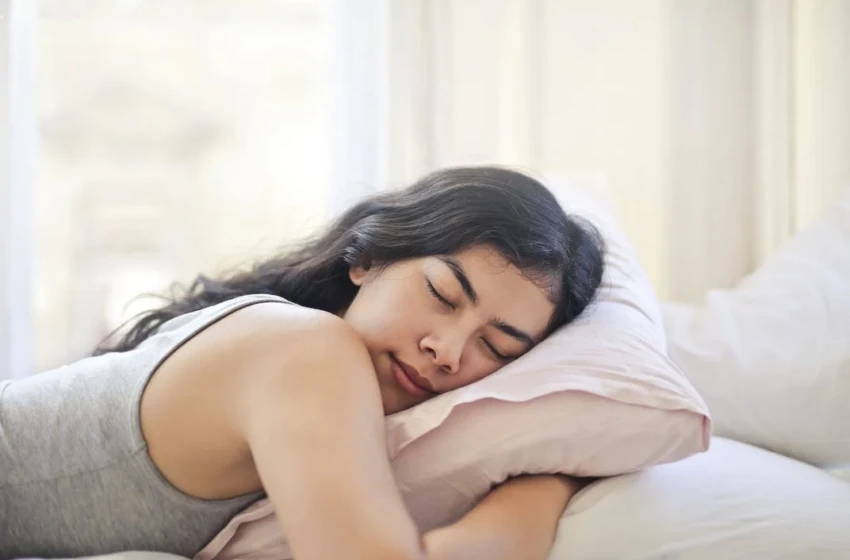Another sleepless night? Even warm milk and counting sheep don’t help you fall asleep? Then try our five tricks to sleep better.

Lie down and sleep – it rarely works that way. You often need up to 15 minutes to calm down. Arrived in dreamland, your body goes full throttle . He uses the time to regenerate. Many parts of the body are active. For example, when it gets dark, the kidneys excrete more urine and thus also pollutants. The brain also detoxifies. Toxic substances that are formed when you are awake but cannot be removed while you are awake are removed at night. The thinking apparatus also processes experiences and information and erases unimportant things while you sleep. That creates space for something new.
Without restful sleep, the body can only partially carry out the regeneration processes. Difficulty concentrating, reduced performance or mental problems occur. If the sleep disturbances last for a long time, the whole body gets confused. Breathing, blood pressure, body temperature, hormones, metabolism – everything is going crazy.
So that a long-term sleep disorder does not develop in the first place, we have five tips for you that will help you fall asleep.
Tip 1: Banish worries from bed
You just want to fall asleep quickly to be fit for the coming day? Instead, you toss and turn in bed. Annoying – but it’s no wonder if you take your problems like money worries, relationship or work stress with you to bed.
Therefore, try to banish all stressful thoughts from your mind and your bedroom. But that doesn’t mean you should put your worries aside. On the contrary. Instead, consciously engage with them at a certain time of day. And the emphasis is on “day”. If you suppress your problems, they will not disappear into thin air. They’ll catch up to you when you don’t have a chance to actively distract yourself. This usually happens in the evening or even in the middle of the night when you wake up and try to go back to sleep. If you suppress these negative thoughts for a long time, an anxiety disorder can even develop, from which around 12 million Germans suffer. So give yourself fixed times in everyday life to deal with your problems. You can write down your worries and to-dos and cross them out when you’ve done them. If they are not solved on the same day, get the list out again on another day. In the evening, however, the sleep-depriving thoughts are taboo.
Tip 2: Get out of bed if you have trouble sleeping
If you can’t fall asleep, don’t stay in bed for long. Why? There is a risk that the brain associates the rest period with insomnia over time – not good conditions for better sleep. If you don’t fall asleep after 15-20 minutes, get back up and do something relaxing, if not boring. The task makes you sluggish, you get tired and you can sleep. Light household tasks such as sorting the laundry or preparing the sofa are suitable for relaxation. You can also put a comfy chair by the bed, grab a not-so-exciting book, and read a few pages. Just don’t make it too exciting or scary, because then you won’t be able to fall asleep again because of the excitement.
Tip 3: Relax – with the right technique
Relaxation techniques are powerful tools to help you fall asleep – if you let yourself go. Jacobson’s progressive muscle relaxation , for example, is suitable for beginners . To do this, lie in your bed as usual and gradually tense individual muscle groups for five seconds and relax again. Slowly work your way from your toes to your forehead. Your breathing is calm and even.
A relaxing mind game is also helpful. Trick your brain by imagining a nice, quiet place. Whether you choose a fictional or real place from your memory is up to you. You can mentally be in the Maldives, your favorite trail running route , or a pasture with sheep. The main thing is that it relaxes you and lets you think of pleasant things so that you can fall asleep blissfully.
Tip 4: No alcohol and heavy food before bed
Too many after-work beers or wine glasses can be sleep killers . Although many people can often fall asleep better after a glass or two of beer, this does not last forever. Alcohol reduces brain activity and turns off the carousel of thoughts. So you fall asleep faster. However, the effect often does not last, because the first quiet half of the night is often followed by a restless second half. That’s because your body has two things to do: break down the alcohol and regenerate. In addition, alcohol increases the urge to urinate and dehydrates the body. You need to go to the bathroom frequently at night or are extremely thirsty, which naturally disrupts your sleep.
Even if you eat greasy food too late, your body has to work more at night. While carbohydrates and proteins are easier to digest, eating greasy food puts your body on a night shift and won’t let it rest.
Tip 5: Pay attention to your biorhythm
If you want to sleep well, balance your biorhythm . More and more people are sitting in poorly lit offices during the day, taking too few breaks and not getting enough light. It doesn’t get any better in the evening: You’re lying on the couch while the living room light is way too bright and the TV flickers. The unnatural cycle of light you are exposed to daily keeps you awake at night. The lack of exercise does the rest for bad sleep. So what to do? Get some fresh air on your lunch break. A walk in the countryside also improves your work performance. Even small sporting exercises during the break improve your biorhythm. Dimmed lighting conditions in the evening prepare your body for sleep. This will help you fall asleep faster.
Electronic devices also interfere with falling asleep. Smartphones, tablets and co. have no place in bed with sleep disorders. The blue light inhibits the production of melatonin, the sleep hormone. If you can’t do without your smartphone, at least put it on night mode. In this way, the activating blue light is reduced and melatonin production is not fully inhibited. The physician Dr. medical Carsten Nolte ready for you.
You’re not alone. Trouble falling asleep are not uncommon. Many people suffer from sleep disorders. According to a survey by Techniker Krankenkasse, almost every second woman and every fourth man is affected . However, if your insomnia persists for several weeks or even months, you should consult a doctor.







Leave a Reply